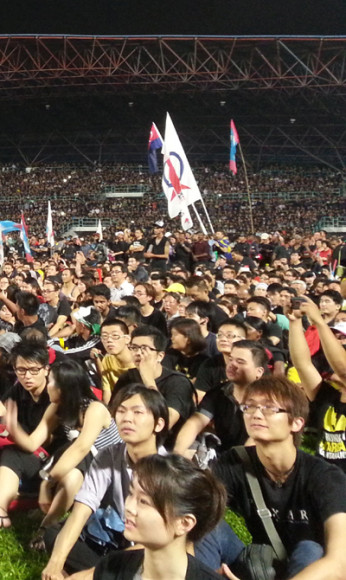
8 May 2013. (Pic courtesy of Sarah Sofian)
WITH its strong showing in the 13th general election since our independence (GE13), should the opposition leader come from the DAP? Will PAS continue with its calls for an Islamic state and hudud? And why didn’t Sabah and Sarawak deliver much-needed votes to the Pakatan Rakyat (PR)? Wong Chin Huat explains.
What does it mean that the DAP is now the strongest party in the opposition coalition? Should the opposition leader in Parliament then be somebody from the DAP?
Although the PR did not get to register itself formally as a coalition, it ran its GE13 campaign in that way. It should, therefore, act as one. The parliamentary opposition leader in the Westminster system is the prime-minister-in-waiting. Since the PR agreed that Datuk Seri Anwar Ibrahim would be prime minister when it takes over, the opposition leader position should also go to Anwar.
There is also no reason to particularly fear the rise of a particular party. While the DAP is the largest party in the PR by parliamentary seats, its 38 seats is less than half of the PR’s 89 seats.
With PAS’s performance in GE13, what does this mean for the hardliners who want to establish an Islamic state and implement hudud?
PAS’s next congress or muktamar must indeed be watched. With the defeat of the party’s mainstreamers/moderates like Mohamad Sabu, Dr Dzulkefly Ahmad, Salahuddin Ayub and Datuk Husam Musa, the puritans/hardliners would likely push for the party to return to its advocacy of an Islamic state rather than a welfare state.
Umno will certainly exploit this to lure PAS’s hardliners in the name of religious unity. In 1974, Najib’s father managed to bring PAS into the BN. But within four years, PAS left with bitterness when it realised that Umno had been undermining its power base in Kelantan. Many PAS old-timers, including spiritual leader Datuk Nik Abdul Aziz Nik Mat, will never allow PAS to rejoin the BN.
Why didn’t Sabah and Sarawak deliver the votes that were needed to help the PR secure Putrajaya?
For those who want change, the election outcome in Sabah and Sarawak was indeed disappointing. Despite the PR’s gains in seats particularly in Sarawak, it picked up only those seats from cities and towns, where the DAP performed tremendously well in the 2011 state elections. Unlike Sabah where at least one bumiputera-dominated seat changed hands, the opposition has failed to make any inroads into inland Sarawak.
Why didn’t Sabah and Sarawak voters vote against the BN despite the fiasco of the Sulu invasion of Lahad Datu, and the Global Witness expose of the land sale scandal involving Tan Sri Abdul Taib Mahmud’s family and cronies? Poverty has made inland voters susceptible to vote-buying. Lack of resources further clipped the opposition’s campaign in these large states, where some constituencies are the size of a West Malaysian state. ![]()
Wong Chin Huat is a political scientist by training and was a journalism lecturer prior to joining the Penang Institute, a Penang government think tank. If readers have questions and issues they would like Wong to respond to, they are welcome to e-mail editor@thenutgraph.com
Read previous Uncommon Sense columns


Pro David says
ANYONE from the Opposition can be the leader as long as all agree to the nominee.
Nothing to discuss and shout about.
Case closed!